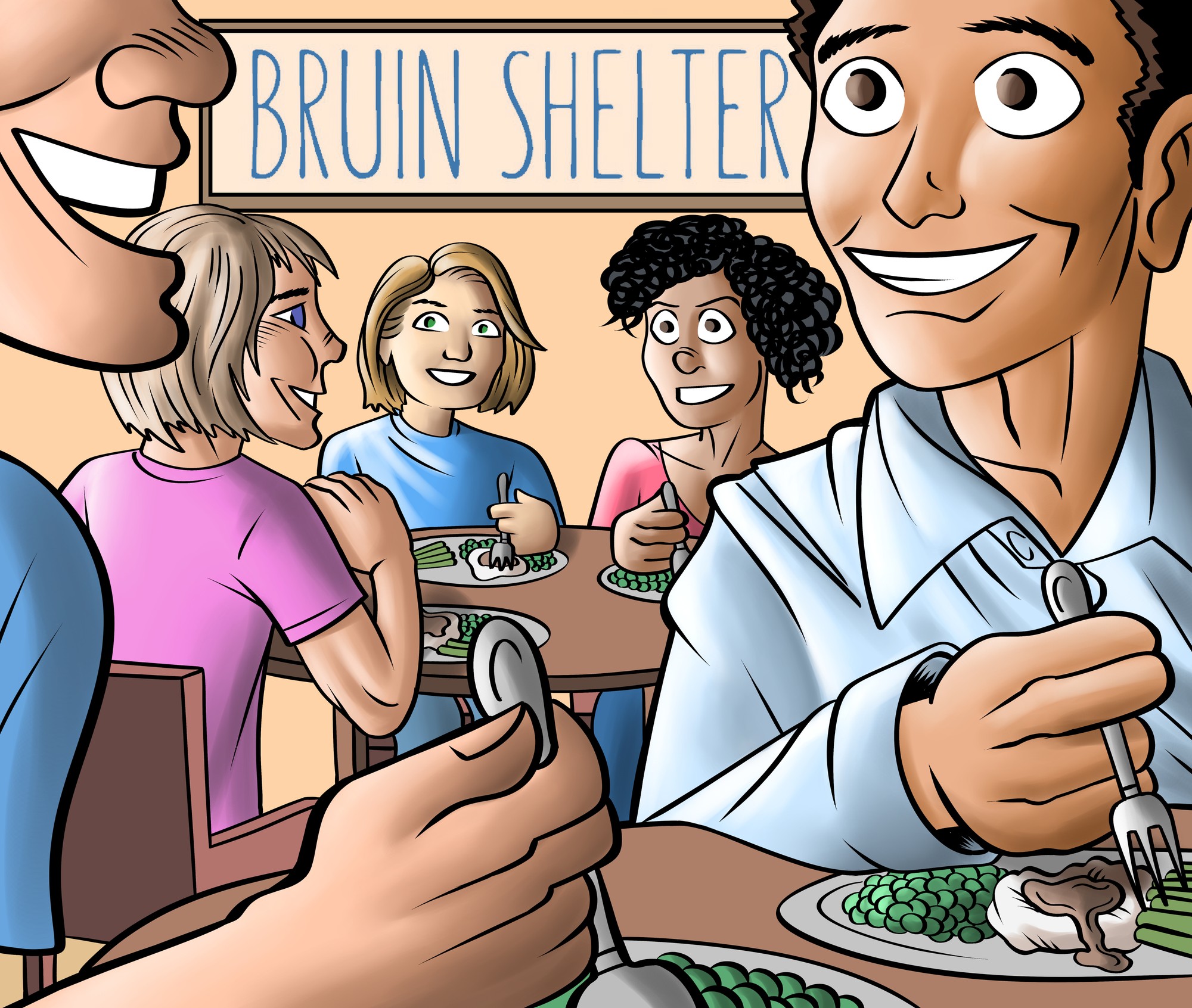Bruin Shelter and UCLA should collaborate in aim to demolish student homelessness

(Cody Wilson/Daily Bruin)

By Lena Nguyen
Sept. 18, 2019 1:04 a.m.
For some students, Los Angeles and surfing on sunny beaches go hand in hand.
But for others, couch surfing is more common than catching waves.
College homelessness is on the rise – it has grown by 7% over the span of three years. Homeless students are a demographic easily hidden in plain sight, as they don’t often fit people’s preconceived notions of homeless individuals – 76% of homeless college students reported sharing houses or living with others, while only 14% reported sleeping in shelters.
And UCLA students host one of those shelters. Opened in 2016 by two doctoral students, Bruin Shelter is one of the first student-run shelters of its kind. Bruin Shelter has always been a separate entity from UCLA – it operates as a 501(c)(3), allegedly in order to bypass the bureaucratic red tape of a public administration.
But it’s time that changed.
The university and Bruin Shelter have worked as separate entities with similar goals for too long. A direct alliance between the student-run shelter and the university would not only help both organizations better provide for students, it would streamline the already difficult process homeless students face when seeking help. And with the help of public university funding and support, Bruin Shelter would have the resources to increase its impact on campus.
And Bruin Shelter has already proved its potential.
Louis Tse, the co-founder of Bruin Shelter and the executive director of Students 4 Students, Bruin Shelter’s parent nonprofit, said these shelters give students access to basic resources necessary to meet their academic needs.
“We offer more than just food or a bed,” Tse said. “The power of a dinner table is giving emotional support and a community for these students.”
But its mission is not something a student organization should have to tackle alone, especially given the ample resources UCLA has to offer.
To its credit, UCLA has also addressed student homelessness, albeit with a different approach – the Economic Crisis Response Team. Created in 2009 after the recession, the ECRT works to help students in financial crises.
The dean of students and chair of the ECRT, Maria Blandizzi, said the organization offers grants, meal vouchers, emergency loans and short-term housing on the Hill or university apartments.
“In the beginning of Bruin Shelter, the Office of the Dean of Students was a guide for them to understand student financial insecurity at UCLA,” Blandizzi said. “There’s no overlap now.”
And though the ECRT and Bruin Shelter both do good work, it seems like a waste not to pool their resources – especially considering they could both benefit.
In the past, Bruin Shelter has barely dodged running out of funding for their operations – putting students depending on their services at a risk of being displaced all over again. UCLA once helped Bruin Shelter get off the ground from a $20,000 grant from the David Geffen School of Medicine at UCLA. But with continued efforts from the shelter and positive results to show for it, that endorsement shouldn’t have ended there.
UCLA could potentially offer insight on student data, financial grants and professional resources to further expand Bruin Shelter, which has a waiting list of about 100 students and less than 30 available beds. And Bruin Shelter can offer the personal, grassroots approach that makes the shelter feel like home.
“We’re all a pathway of services, and ECRT and Office of the Dean of Students lends its own vision on the issue,” Blandizzi said.
A pathway of services that leaves Bruin Shelter by the wayside, that is.
At the end of the day, the end of student homelessness at UCLA starts with making sure Bruin Shelter only has to worry about the people, and not about the money.
Scott Sale, executive director of Safe Parking LA, an organization that connects those living in their vehicles to designated safe overnight parking lots, said stigma continues to persist for college students facing homelessness.
“It’s important for the public and for students to know that being homeless does not equate to being a criminal, a bad person, being incapable of complying with local regulations or being a risk to others,” Sale said.
At the University of California level alone, 5% of students across all campuses experienced homelessness – and that’s only counting those who reported it.
But with the nature of homelessness shifting, homeless college students can be more difficult to identify – and thereby more difficult to help.
“The perception of crashing on couches has changed over the decades,” Tse said. “There’s more instability, because having no control over where you can sleep or losing your emotional support systems can cause students stress.”
Bruin Shelter has been doing great work to help these students – just as UCLA has. But with homelessness on the rise at college campuses, keeping these efforts separated is only a disservice to the greater population both entities are trying to serve.
Granted, keeping the university and Bruin Shelter separate may have worked initially – beginning as an independent nonprofit may have helped it self-start without too many “no’s” in the way. But the current situation calls for a new approach. Now that Bruin Shelter has established itself as an effective ally to homeless students, UCLA has a responsibility to help it wade through that red tape.
And with rising costs, higher demand and only so much real estate in the area, a partnership is necessary to expand the help they give.
After all – change comes in waves, and this is one that our school needs to ride out to support students navigating rough waters.

